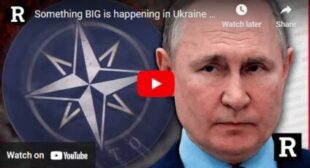
NATO members over the past few days have started beating the drum that Ukraine is collapsing and are talking about next steps including putting western NATO forces into the battle. Putin just issued his strongest warning yet to NATO. Stay out or else.
John Mearsheimer | THE US CREATES CONFLICT FOR THE WORLD
The War You Don’t See: Why Propaganda Hides the True Face of War John Pilger’s film is a powerful and timely investigation into the media’s role in the war.
The War You Don’t See traces the history of ’embedded’ and independent reporting from the carnage of World War I to the destruction of Hiroshima, and from the invasion of Vietnam to the war in Afghanistan. As weapons and propaganda are ever more sophisticated, the very nature of war has developed into an ‘electronic battlefield’. But who is the real enemy today? John Joseph Mearsheimer is an American political scientist and international relations scholar, who belongs to the realist school of thought. He is the R. Wendell Harrison Distinguished Service Professor at the University of Chicago. He has been described as the most influential realist of his generation. Mearsheimer was born in December 1947 in Brooklyn, New York City. When he was eight, he moved with his family to Croton-on-Hudson, a suburb in Westchester County. When he was 17, Mearsheimer enlisted in the US Army. After one year as an enlisted member, he obtained an appointment to the US Military Academy at West Point, which he attended from 1966 to 1970. After graduation, he served for five years as an officer in the US Air Force. In 1974, while he was in the Air Force, Mearsheimer earned a master’s degree in international relations from the University of Southern California. He entered Cornell University and in 1980 earned a Ph.D. in government, specifically in international relations. From 1978 to 1979, he was a research fellow at the Brookings Institution in Washington, DC. From 1980 to 1982, he was a postdoctoral fellow at Harvard University’s Center for International Affairs. During the 1998–1999 academic year, he was the Whitney H. Shepardson Fellow at the Council on Foreign Relations in New York. Since 1982, Mearsheimer has been a member of the faculty of the Department of Political Science Faculty at the University of Chicago. He became an associate professor in 1984 and a full professor in 1987 and was appointed the R. Wendell Harrison Distinguished Service Professor in 1996. From 1989 to 1992, he served as chairman of the department. He also holds a position as a faculty member in the Committee on International Relations graduate program, and he is a co-director of the Program on International Security Policy. Mearsheimer’s books include Conventional Deterrence (1983), which won the Edgar S. Furniss Jr. Book Award; Nuclear Deterrence: Ethics and Strategy (co-editor, 1985); Liddell Hart and the Weight of History (1988); The Tragedy of Great Power Politics (2001), which won the Lepgold Book Prize; The Israel Lobby and U.S. Foreign Policy (2007); and Why Leaders Lie: The Truth About Lying in International Politics (2011). His articles have appeared in academic journals like International Security and popular magazines like the London Review of Books. He has written op-ed pieces for The New York Times, the Los Angeles Times, and the Chicago Tribune. Mearsheimer has won several teaching awards. He received the Clark Award for Distinguished Teaching when he was a graduate student at Cornell in 1977, and he won the Quantrell Award for Excellence in Undergraduate Teaching at the University of Chicago in 1985. In addition, he was selected as a Phi Beta Kappa Visiting Scholar for the 1993–1994 academic year. In that capacity, he gave a series of talks at eight colleges and universities. In 2003, he was elected to the American Academy of Arts and Sciences. He is the recipient of the American Political Science Association’s 2020 James Madison Award, which is presented every three years to an American political scientist who has made distinguished scholarly contributions. The Award Committee noted that Mearsheimer is “one of the most cited International Relations scholars in the discipline, but his works are read well beyond the academy as well.” Mearsheimer’s works are widely read and debated[according to whom?] by 21st-century students of international relations. A 2017 survey of US international relations faculty ranks him third among “scholars whose work has had the greatest influence on the field of IR in the past 20 years.”
